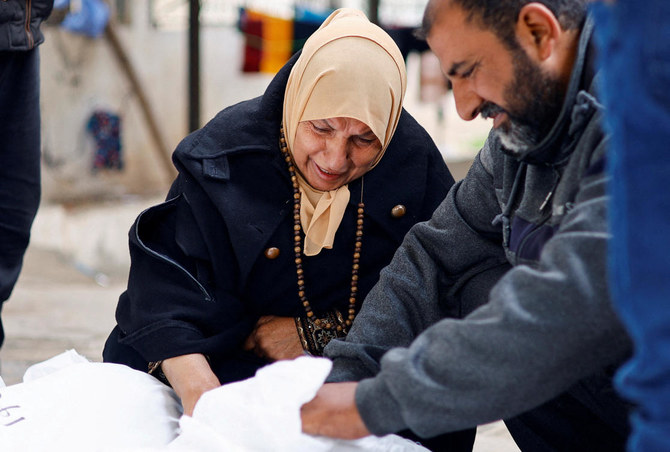GAZA STRIP: The health ministry in Gaza on Sunday said the death toll in the war-torn Palestinian territory breached 25,000 as Israel pushed its southward offensive and renewed bombardment in the north.
Witnesses told AFP Israeli boats were bombarding Gaza City and other areas in the north early Sunday. Hamas has also reported heavy combat in the north.
“Dozens are still under the rubble,” the Hamas government’s media office said, adding that the dead and injured “could not be transferred to hospitals due to the continued artillery shelling on... Khan Yunis and the Tal Al-Hawa area in Gaza City and the north.”
The Israeli army said it “eliminated a number of terrorists” in the main southern city of Khan Yunis and killed 15 militants in northern Gaza over the past day.
Thick plumes of smoke billowed above Khan Yunis on Sunday morning, AFP journalists saw.
The October 7 attacks by Hamas resulted in the deaths of about 1,140 people, mostly civilians, according to an AFP tally based on official Israeli figures.
Israel’s relentless bombardment and ground offensive have killed at least 25,105 people in Gaza, mostly women and children, according to the Hamas-run health ministry.
HOSTAGES
Hamas militants also seized about 250 hostages during the October attacks.
Israel says around 132 remain in Gaza, of whom at least 27 captives are believed to have been killed, according to an AFP tally based on Israeli figures.
In a briefing on Saturday evening, Israeli military spokesman Daniel Hagari said troops had found a tunnel in Khan Yunis where some hostages had previously been kept.
Among the evidence of their presence were paintings, including by a five-year-old captive, he said.
“About 20 hostages” had been held there at different times “in difficult conditions without daylight... with little oxygen and terrible humidity.”
Soldiers entered the tunnel and fought a battle with militants in which “the terrorists were eliminated,” Hagari said.
Israeli Prime Minister Benjamin Netanyahu is under intense pressure to return the hostages and account for security failings surrounding the October attacks.
Thousands protested across Israel on Saturday evening to demand the release of the hostages and early elections to oust Netanyahu.
Avi Lulu Shamriz, the father of Alon Shamriz, a hostage mistakenly killed by Israeli troops earlier in the war, told AFP in Tel Aviv Netanyahu’s war cabinet was heading for disaster.
“The way we’re going, all the hostages are going to die. It’s not too late to free them.”
DISPLACEMENT
The UN agency for Palestinian refugees says about 1.7 million people have been displaced in Gaza, with about one million crowded into the Rafah area.
UN agencies have warned better aid access is needed urgently as famine and disease loom.
Diplomatic efforts have sought to secure scaled-up aid deliveries for Gaza and a truce, after a week-long cessation of hostilities in November saw Hamas release dozens of hostages in exchange for Palestinian prisoners held by Israel.
Hamas’s Qatar-based chief Ismail Haniyeh was in Turkiye Saturday for talks with the foreign minister, diplomatic sources said, renewing ties with the key regional power which asked the group’s leaders to leave the country following the October attacks.
Violence has meanwhile surged in the Israeli-occupied West Bank since October 7.
The Israeli military said it demolished two houses in Hebron belonging to two Palestinian gunmen who carried out an attack on a road between Jerusalem and Bethlehem in November.
An AFP journalist saw a fireball erupt and smoke billowing from a home on Sunday as Israeli armored vehicles maneuvered through Hebron’s roads during the raid.
Palestinians gathered outside the crumpled remains of one of the homes on Sunday, with young boys weaving their way through a thicket of tangled metal and rubble.
One man removed a banner Israeli forces attached to a destroyed house which read: “terrorism has no home.”
The official Palestinian news agency Wafa reported clashes between Israeli troops and Palestinian fighters in a village south of Jenin and the towns of Arura and Qalqilya.
Rising tensions and violence across the Middle East have also stoked fears of a wider conflagration involving Iran-backed groups in Lebanon, Iraq, Syria and Yemen.
Iranian media said an Israeli strike on Damascus on Saturday killed the Revolutionary Guards’ spy chief in Syria and four other Guards members, prompting a threat of retaliation.



























